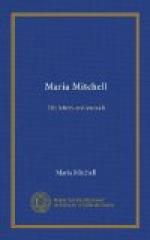the elder Mr. Bond, except that he talks more
readily; but he is womanly in his nature, not a tyrant
like Whewell. Sir John is a better listener than
any man I have met in England. He joins in
all the chit-chat, is one of the domestic circle,
and tells funny little anecdotes. (So do Whewell
and Airy.)
The Herschels know Abbot Lawrence and Edward Everett—and everywhere these two have left a good impression. But I am certainly mortified by anecdotes that I hear of “pushing” Americans. Mrs. —— sought an introduction to Sir John Herschel to tell him about an abridgment of his Astronomy which she had made, and she intimated to him that in consequence of her abridgment his work was, or would be, much more widely known in America. Lady Herschel told me of it, and she remarked, “I believe Sir John was not much pleased, for he does not like abridgments.” I told her that I had never heard of the abridgment.
There are other guests in the house: a lady whose sister was among those killed in India; and her husband, who is an officer in the army. We have all been playing at “Spelling” this evening, with the letters, as we did at home last winter.
Sunday, 15th. I thought of going to London to-day, but was easily persuaded to stay and go with Lady Herschel to-morrow. All this afternoon I have spent listening to Sir John, who has shown me his father’s manuscript, his aunt’s, beautifully neat, and he told me about his Cape observations.
The telescope used at the Cape of Good Hope lies in the barn (the glass, of course, taken care of) unused; and Sir John now occupies himself with writing only. He made many drawings at the Cape, which he showed me, and very good ones they are. Lady Herschel offers me a letter to Mrs. Somerville, who is godmother to one of her children. I am afraid I shall have no letter to Leverrier, for every one seems to dislike him. Lady Herschel says he is one of the few persons whom she ever asked for an autograph; he was her guest, and he refused!
Just as I was coming away, Sir John bustled up to me with a sheet of paper, saying that he thought I would like some of his aunt’s handwriting and he would give it to me. He had before given me one of his own calculations; he says if there were no “war, pestilence, or famine,” and one pair of human beings had been put upon the globe at the time of Cheops, they would not only now fill the earth, but if they stood upon each other’s heads, they would reach a hundred times the distance to Neptune!
I turned over their scrap-books, and Sir John’s poetry is much better than many of the specimens they had carefully kept, by Sir William Hamilton. Sir William Hamilton’s sister had some specimens in the book, and also Lady Herschel and her brother.
Lady Herschel is the head of the house—so is Mrs. Airy—so, I suspect, is the wife in all well-ordered households! I perceived that Sir John did not take a cup of tea until his wife said, “You can have some, my dear.”
Mr. Airy waits and waits,
and then says, “My dear, I shall lose
all my flesh if I don’t
have something to eat and drink.”




